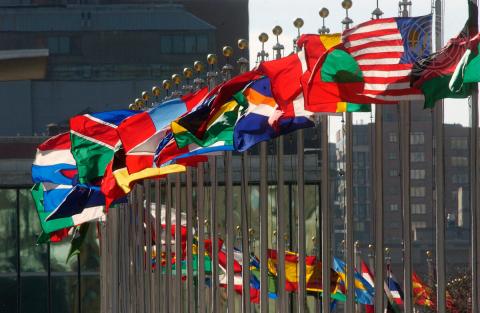
UNITAR Online Catalogue
UNITAR - UEV Master in International Leadership and Negotiation

Multilateral Diplomacy
Background
The increase in volatility, uncertainty, complexity, and ambiguity (VUCA) in today’s world means there is no longer one approach to management that can be applied to all organizations and work environments. Leaders must adjust their leadership strategies and styles to be more flexible and adapt to a variety of challenges andsituations.
In this context, the Universidad Europea de Valencia and the United Nations Institute for Training and Research (UNITAR) developed the Master in International Leadership and Negotiation to prepare students to lead global initiatives for change and provide them with the necessary negotiation skills to positively impact their organization and environment.
The fee will be paid in EUR (EUR 9,000).
Learning Objectives
The overall objective of the Master’s Programme is to equip students with the vital skillset for leadership positions in international and multilateral working environments.
At the end of the one-year Master 's Programme, students will be able to:
- Understand their personal and cultural leadership style by maximizing their unique strengths;
- Apply skills, techniques, and practices to break through negotiation deadlocks and create mutual gain in any negotiation context;
- Gain understanding of the complexity involved in coordination and stakeholder engagement in different social, political and cultural contexts;
- Apply public speaking, presentation, speechwriting, and reporting techniques, – including preparation, structure, and delivery;
- Demonstrate the ability to use voice and words to effect when giving presentations: wording, diction, intonation, rhythm, and pacing.
Content and Structure
The UNITAR – UEV Master in International Leadership and Negotiation will start in October 2022. Over a period of ten months, students need to acquire a total of 60 ECTs to complete the Master's Programme successfully.
Nine thematic modules related to the fields of leadership and negotiation will be delivered over a period of nine months. Students receive 5 ECTs for each module completed. The blended learning system allows students to combine the master with other professional or educational activities.
Modules:
- Introduction to Leadership
- The Process of Decision-Making
- Leadership Skills and Risk Management
- Stakeholder Engagement and Coordination
- Negotiation Skills and Techniques
- Overcoming Negotitation Deadlocks
- Conference Diplomacy and Multilateral Negotiations
- Mediation, Conflict Resolution and Difficult Conversations
- Public Speaking and Media Relations (Training Workshop)
Transversal Project
In addition to completing the nine thematic modules, each student needs to develop a transversal project in a group of two to three students throughout the Master’s Programme. This project is designed as a team activity to strengthen relationships among students and aims at deepening the acquired leadership and negotiation skills. The results of the transversal project need to be presented by each group in the final week of the Master’s Programme. The successfully completed transversal project will be rewarded with 6 ECTs.
Master Thesis
Furthermore, each student needs to produce a final research paper (9 ECTs) extending beyond the theoretical contents of the thematic modules and relating to the participant’s professional field.
Methodology
The modules are designed to be highly interactive and participatory and will include – whenever possible – a variety of simulation exercises, case studies, group work, stakeholder discussions and pedagogical tools to enable students to acquire a thorough knowledge and understanding of substantive topics, as well as a practical appreciation of leadership styles and techniques and negotiation processes and dynamics.
All classes will be taught by professors with proven international experience in leadership, negotiation, and diplomacy.
Additionally, students will be provided with a comprehensive set of training materials, allowing them to follow the activities with ease and to deepen their knowledge with relevant background readings.
Targeted Audience
The UNITAR - UEV Master in International Leadership and Negotiation is designed for students from the fields of International Relations, Diplomacy, International Studies, Global Studies, EU Studies, International Public Law, Human Rights, International Economics, International Business, International Security Studies, and Defense Studies.
The programme is also highly recommended to government workers, diplomats, employees at international organizations, professionals in the field of Human Development and members of multinational companies.
Additional Information
WEBINAR
Please click here to watch our webinar on "Leadership Trends for a Post-Pandemic World" with one of our expert, Jérôme L'host.
Please click here to watch the webinar on "Seven Principles that Make Negotiators Great" with Ambassador Mr. Villalonga, one of our experts teaching in the Master's Programme.
ENTRY REQUIREMENTS
In order to be considered for the Master in International Leadership and Negotiation, candidates must be fluent in English, possess a valid passport or national identity cards and have completed an undergraduate degree.
After signing up, you must submit the required documentation:
- Admission application
- Photocopy of the national ID card (DNI or NIE)
- Photocopy of your university degree
- CV
The admissions team will guide you in your professional future and will arrange an interview with the director of the Master's degree to evaluate your candidacy.
ADMISSION PROCESS
Admission is granted on a rolling basis. However, early application is recommended given the limited number of places on the programme.
Please find more information on the Universidad Europea de Valencia here.